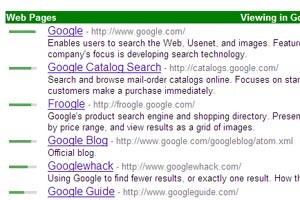Links are important to Google, Yahoo and MSN in determining where your site is placed within the search results. As you probably know, the more links, the better you will place.
The engines place a weighting factor on each link. That is, a link from an important site like CNN.com would count for a lot more than Jimmy Bob's personal homepage.
Google calls its importance-scoring system "PageRank," and it's been a fundamental building block of Google's ranking algorithm since day one. Tactically improving the PageRank—or, more generically, your "link gain" across all the major engines—of your homepage and of key internal pages of your site is critical to being well-ranked and thus getting traffic.
Links are the currency of the Web, so it is important to have a plan in place to improve the number and quality of the links to your site from the outside. That is the idea behind link building.
Link building can be approached a number of ways. You can, for example:
- Garner links from vendors, clients, business partners
- Garner links from other related sites
- Garner links through general directory entries, like Yahoo
- Garner links through specific directory entries, like a marketing services directory if you are a marketing consultancy
- Sponsor organizations and get acknowledgement through a link from their Web sites
- Create content and syndicate through RSS so that other sites will post the content contained within your RSS feed on their sites with a link back to your site.
It is not just about the importance of the page, or the PageRank score. You probably get bonus points for a link from a topically relevant or authoritative site, so target topically relevant sites in particular when link building.
By the way, the worst kind of link building is sending unsolicited email to Web masters asking for a reciprocal link. Web masters get inundated with such spam daily.
Each page within a Web site is assigned its own PageRank score by Google. PageRank scores run from 0 to 10 on a logarithmic scale, meaning that the gaps between the integers increase logarithmically the closer you get to 10. So, for example, the gap between the 3 and a 4 is quite small, whereas the gap between 7 and 8 is huge in comparison. As such, boosting your PageRank from a 3 to 4 would be quite easy, and going from a 7 to 8 would be quite hard. Another logarithmic scale you might be familiar with is the Richter scale. As you probably know, a 5.0 on the Richter scale isn't such a huge deal, whereas a 7.0 is a very big deal indeed.

You can check your PageRank score several ways. One is using the Google Toolbar, available for download from toolbar.google.com. It works with Internet Explorer (for Windows) and with Firefox, users of which also have access to an alternative toolbar with a PageRank meter available at www.prgooglebar.org.
You can also check your homepage's PageRank score using the Google Directory at directory.google.com—assuming, of course, that you are listed in the Google Directory! If you aren't listed, you can submit through the "Add Site" link at the bottom of the appropriate category page where you wish to be listed.
Listings on Google Directory category pages are ranked in order of PageRank score. This means it is possible for you to see your site make small PageRank shifts relative to other sites in your category, particularly if there are a number of sites listed on your category page. (If you are curious where your site sat in comparison to others listed on that category page in the past, you can get historical PageRank scores using the Wayback Machine available from Alexa at www.archive.org.)
A word of caution: don't be overly focused on what that little green PageRank meter says. PageRank values shown in the Google Toolbar are imprecise, months old and not the same as the PageRank that is used in Google's ranking algorithm. Google realizes that it's really only search engine optimizers who care about the PageRank scores, and they don't want to be too helpful to SEOs. So PageRank scores should be treated as merely indicative, and so you have to take them with a grain of salt.
PageRank as an algorithm is alive and well, and will adapt with the times. One way we can probably expect to see it evolve is with the incorporation of "TrustRank," a concept where a small number of reputable seed pages are used to help differentiate good pages from spam.
There is a tactic called "Google bombing" whereby linking to a site with particular words in the link text can get a site highly ranked for those keywords in the search engines, including Google, Yahoo and MSN. One of the most famous Google bombs has been George W. Bush's biography page on whitehouse.gov being ranked number one for the phrase "miserable failure"—even though neither the word "miserable" nor the word "failure" appear anywhere on Dubbya's page. It was the sheer power of the inbound links with the link text that did it.
Not all links from a high PageRank-endowed page are equally as good. For instance, if there are a great deal many other links on that page that link to you, you will end up with only a small share of the link gain that has been passed down, as you are sharing it with the multitude of other sites linked on that page. The fewer the number of links, the better.
Reciprocal links are likely to get discounted. Search engines have a fantastically comprehensive link map of the Web, so they can spot reciprocal links easily. As you can imagine, getting your golf buddy to link to you and you, in turn, linking back isn't as useful to the search engine users than an industry resource site linking to your site, because it is relevant and useful for that link to be only one way.
Links from affiliated sites (those on the same IP range or host name) will likely be discounted as well, as will footer links located at the bottom of all the pages site-wide.
Some types of links are just bad news. Google warns not to link to what it calls "bad neighborhoods." These would include link farms and search engine spam sites, in fact don't participate in "link farms" or FFA, also known as free for all sites, at all. (If you're wondering how to identify a link farm from a directory, link farms tend to be less organized and have more links per page.) When you get emails inviting you to get a link submitted to many thousands of search engines and directories, do not respond. At best, these sites are irrelevant. At worst, which is most likely the case, they consist of link farms and bad neighborhoods. The results of participation can be devastating and include ranking penalties or even the banning of your site.
One of the keys to garnering links is to offer link-worthy content and to keep that content fresh. You can proactively solicit links. If you do, you need to do it carefully. I recommend the following process:
Step 1: Identify suitable link targets
Review links of competitive sites and sites in your keyword market. SEO Chat's PageRank search tool is very handy in identifying link targets with high PageRank scores. With it, you can conduct Google queries and have the tool return the results in order of PageRank score rather than relevance.
I use the tool several ways:
- Checking backlinks of competitors' sites
- Checking keywords relevant to the client's industry
- Using the site: query operator to restrict results to specific TLDs (top level domains) and countries
One downside of this tool (and of Google's backlink checking in general) is that the backlink searches are not comprehensive. It is only a sampling of the total number of backlinks, and those backlinks are only to the page specified, such as the homepage, and not to the entire site.
On the other hand, Yahoo offers a query operator linkdomain: that allows you to see all backlinks coming in to any page on the site. Furthermore, Yahoo allows you to further restrict a linkdomain: or link: search by subtracting particular sites from the search result. For example, you could do a linkdomain: query on Yahoo and subtract your own site from the search results, seeing only inbound links from other sites into your own, rather than seeing pages of your own site linking to yourself.
Step 2: Contact them and try and persuade them to link to you
You can beg, borrow or buy a link. (But I doubt you could steal one, although the blog comment spammers and guestbook spammers have managed to steal links to some degree of effectiveness—a very bad thing.)
How could you "buy" one? You might be able to obtain a link by "sponsoring" their organization with cash or "in kind" services or by buying text link advertising on their site through a broker such as Text-Link-Ads.com.
You could suggest a link as a site visitor, or you could contact them representing yourself from your site. If you represent a site visitor, you should probably give them some additional constructive feedback besides inclusion of your link. For instance, in the same email let them know of any broken links on their site that you have spotted or of any other suggested links besides your own.
Remember, offering a reciprocal link in exchange is not a viable approach, because their link to you will not be worth as much once the search engines pick up the fact that you link back to them.
If this approach sounds oversimplified, it is. Link building is arguably the most challenging aspect to search engine optimization. It's anything but straightforward; the process is fraught with landmines; and the outcome is largely outside of your control—since you can't dictate who links to you and who doesn't.
Note: Stephan Spencer and link-building expert Eric Ward will be leading a MarketingProfs seminar Thursday, November 10: "Google Success: Link for High Rankings" will guide attendees through the quagmire and light the way to top search engine rankings. Get more information or sign up.




